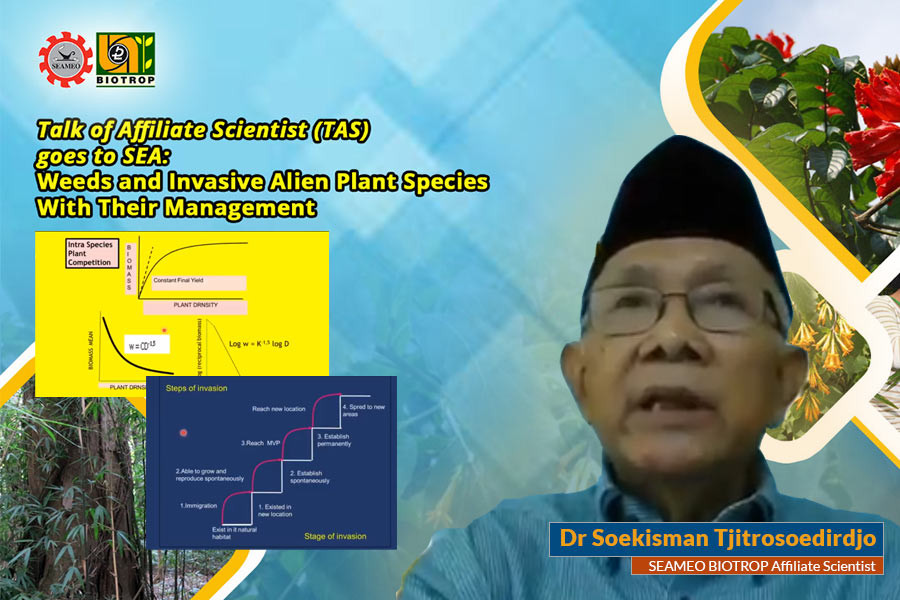Invasive alien species (IAS) are plants, animals, pathogens and other organisms that are non-native to an ecosystem, which may cause adverse effects on the economy, environment or human health. In particular, IAS threatens biodiversity, including the decline or elimination of native species, through competition, predation, or transmission of pathogens as well as the disruption of local ecosystems and ecosystem functions. In 2006, the Convention of Biological Diversity (CBD) stated that since the 17th century, invasive alien species have contributed to nearly 40% of all animal extinctions for which the cause is known.
Invasive alien species invade and affect the native biota in almost every ecosystem type in all major taxonomic groups on the Earth. In economic terms, the costs of invasive alien species are significant. Total annual costs, including losses to crops, pastures and forests, as well as environmental damages and control costs, have been conservatively estimated to be in the hundreds of billions of dollars and possibly more than one trillion. This does not include valuation of species extinctions, losses in biodiversity, ecosystem services and aesthetics.
In further understanding the impact of invasive alien species, SEAMEO BIOTROP brought out the theme “Weeds and Invasive Alien Plant Species and Their Management” as the theme for the Talk of Affiliate Scientists held on 22 June 2022. The resource person was Mr. Soekisman Tjitrosemito, PhD, a prominent expert in weed science and invasive alien species. The moderator of this event was Mr. Saiful Bahri.
“It is our duty to save Indonesia’s Biodiversity for our next generation”, stated Dr Zulhamsyah Imran, the Director of SEAMEO BIOTROP, in his opening remarks of this event. He further shared that SEAMEO BIOTROP has been providing its best efforts to overcome these concerning issues regarding Invasive Alien Species, by actively participating in the SMIAS Project (Strengthening Capacities for Management of Invasive Alien Species) in Indonesia, funded by the Global Environment Facility (GEF). The acknowledgment of the Center’s role as “a leading Center in promoting and enriching the real values of tropical biology in Southeast Asia”, is the basic fuel of the Center to encourage the action programs using the tagline “Save Biodiversity". The action programs are framed with the target of Tropical Biodiversity from Mountain to Ocean (MoTO), and derived into three flagship programs, namely: 1) Ecosystem Restoration and Conservation, 2) Sustainable Use of Biodiversity, Bioenergy, Biotechnology to Support Food Security, 3) Resilience in the face of Global Climate Change.
The Talk of Affiliate Scientist was actively participated by 115 participants from national parks, environment and forestry offices, research institutions, and universities. The theme of this event focused on the concept of weeds and their management with emphasis on invasive alien plants species management, both in national and global perspectives. The critical issue in IAS management is the ecological approach which combines the existing social and cultural values of IAS in a society. Generally, the management of invasive plants will always intersect with the social and cultural aspects of people living surrounding the area. On the other hand, IAS has abilities to quickly spread and propagate so that IAS can cause the decline of the indigenous biodiversity in an area, and thus threaten the foundation of human life. Therefore, it is crucial to involve multi-sectoral efforts in controlling IAS.
Upon the discussion, several issues emerged as the current status of IAS main problems in Indonesia, i.e., 1) IAS is an international issue, however, it has not been acknowledged as a national issue in Indonesia; 2) Very few regulations and institutions related to IAS; 3) Lack of coordination among institutions related to IAS; 4) Very rare baseline data related to IAS in terms of species abundance and their distribution; 5) Lack of competent human resources; and 6) Lack of national funding for IAS management. Based on those issues, several actions were proposed during this event, such as 1) Identification and inventory of invasive alien plant species (IAPS); 2) Mapping the distribution of IAPS; 3) Risk analysis of IAPS; 4) Determination of IAS Priority; and 5) handling and manage IAS priorities. (sis, sb).
 Monday, 27 June 2022 on 11:28am
Monday, 27 June 2022 on 11:28am
